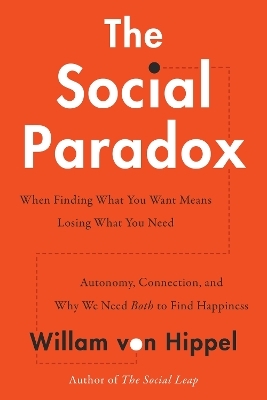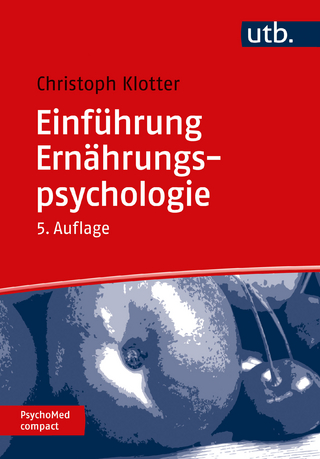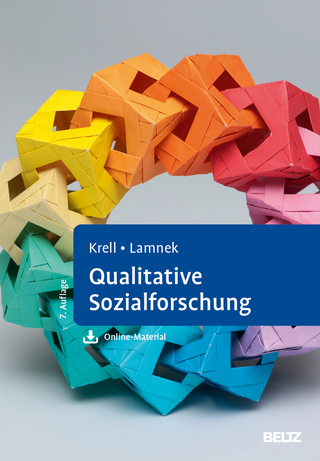
The Social Paradox
Autonomy, Connection, and Why We Need Both to Find Happiness
Seiten
2025
Harper (Verlag)
978-0-06-331925-7 (ISBN)
Harper (Verlag)
978-0-06-331925-7 (ISBN)
- Noch nicht erschienen (ca. März 2025)
- Versandkostenfrei innerhalb Deutschlands
- Auch auf Rechnung
- Verfügbarkeit in der Filiale vor Ort prüfen
- Artikel merken
From the author of The Social Leap comes this thought-provoking exploration into humans’ two core evolutionary needs, for connection and autonomy, how the modern world has thrown them out of whack, and how we can rebalance them to improve our lives.
Why do people who have so much—leading comfortable lives filled with unprecedented freedom, choice, and abundance—often feel so unhappy and unfulfilled? This phenomenon is a defining paradox of our time and one we endlessly seek to solve. In The Social Paradox, psychologist William von Hippel argues that we need to think about this problem in a new way. By changing our perspective, we might finally see the solution, bringing us greater happiness and more satisfying relationships.
The key is to understand the interplay between our two most basic psychological needs—for connection and autonomy. Evolution made us dependent on one another for survival, instilling in us a strong need to connect. It also made us seek autonomy, so our ancestors could distinguish themselves within their groups, improving their chances to procreate and gain status.
These two opposing needs are our most fundamental psychological drivers, and while our lives once ensured a happy balance between them, the opportunities of today’s world have thrown it out of whack. As von Hippel explains, our modern world no longer demands connection but it provides endless opportunity for autonomy; this lopsidedness lies at the root of many of our most intractable problems. Recognizing this imbalance and working to counter it can drastically change how we make decisions, spend our time, and find happiness.
The Social Paradox invites us to examine the fundamental building blocks of life and society—politics, religion, urban living, marriage—in a brand-new way. Once we understand the evolutionary forces driving us, we can begin to see how to counteract the emptiness and loneliness of contemporary life.
Why do people who have so much—leading comfortable lives filled with unprecedented freedom, choice, and abundance—often feel so unhappy and unfulfilled? This phenomenon is a defining paradox of our time and one we endlessly seek to solve. In The Social Paradox, psychologist William von Hippel argues that we need to think about this problem in a new way. By changing our perspective, we might finally see the solution, bringing us greater happiness and more satisfying relationships.
The key is to understand the interplay between our two most basic psychological needs—for connection and autonomy. Evolution made us dependent on one another for survival, instilling in us a strong need to connect. It also made us seek autonomy, so our ancestors could distinguish themselves within their groups, improving their chances to procreate and gain status.
These two opposing needs are our most fundamental psychological drivers, and while our lives once ensured a happy balance between them, the opportunities of today’s world have thrown it out of whack. As von Hippel explains, our modern world no longer demands connection but it provides endless opportunity for autonomy; this lopsidedness lies at the root of many of our most intractable problems. Recognizing this imbalance and working to counter it can drastically change how we make decisions, spend our time, and find happiness.
The Social Paradox invites us to examine the fundamental building blocks of life and society—politics, religion, urban living, marriage—in a brand-new way. Once we understand the evolutionary forces driving us, we can begin to see how to counteract the emptiness and loneliness of contemporary life.
William von Hippel grew up in Alaska, got his B.A. at Yale and his PhD at the University of Michigan, and taught for a dozen years at Ohio State University before finding his way to Australia, where he was a professor of psychology at the University of Queensland. He has published more than 150 articles, chapters, and edited books, and his research has been featured in the New York Times, USA Today, The Economist, Le Monde, El Mundo, Der Spiegel, The Australian, and the BBC. He lives in Brisbane, Australia.
| Erscheint lt. Verlag | 27.3.2025 |
|---|---|
| Verlagsort | New York |
| Sprache | englisch |
| Maße | 152 x 229 mm |
| Gewicht | 454 g |
| Themenwelt | Geisteswissenschaften ► Psychologie ► Sozialpsychologie |
| Naturwissenschaften ► Biologie ► Evolution | |
| Sozialwissenschaften ► Ethnologie | |
| Sozialwissenschaften ► Soziologie | |
| ISBN-10 | 0-06-331925-X / 006331925X |
| ISBN-13 | 978-0-06-331925-7 / 9780063319257 |
| Zustand | Neuware |
| Haben Sie eine Frage zum Produkt? |
Mehr entdecken
aus dem Bereich
aus dem Bereich
Buch | Softcover (2024)
Heyne (Verlag)
12,00 €


